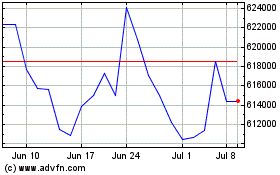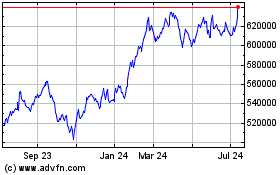By Yuka Hayashi
This article is being republished as part of our daily
reproduction of WSJ.com articles that also appeared in the U.S.
print edition of The Wall Street Journal (March 10, 2018).
WASHINGTON -- Manufactured-home sellers would regain the ability
to steer customers to their own financing arms in a banking bill
making its way through Congress, likely a big boost for Warren
Buffett's Clayton Homes Inc.
Clayton Homes, a unit of Berkshire Hathaway Inc. and the
dominant player in the manufactured-housing sector, spent $280,000
on lobbying last year to free the industry from postcrisis rules
that barred mobile-home sellers from engaging with buyers on
financing options, according to OpenSecrets.org.
Manufactured housing, popular in rural regions, costs less than
brick-and-mortar properties and comes with sales and financing
strategies more in line with the auto industry than real estate.
Buyers are less likely to show up at a dealer having arranged
financing, and the industry argues being subject to broader housing
restrictions has hurt it.
The bill, expected to clear the Senate by next week, includes a
provision that would exempt manufactured-housing companies from
lending rules covering other parts of the housing market -- a
likely boon for these firms, which earn a big chunk of their
profits by lending people money to buy the homes. Under the
provision, sellers would be allowed to refer customers to lenders,
including affiliated ones, as long as they receive no compensation
for the referral and disclose the ties.
Clayton Homes is a dominant player in this market, and consumer
advocates say the bill would further expand its advantage. The
company, which Berkshire Hathaway acquired in 2003, accounts for
roughly half of U.S. sales of manufactured homes. Its two
affiliated lenders together accounted for 38% of all financing for
such homes in 2016, compared with 3.5% for Wells Fargo & Co.,
the No. 3 lender, according federal government data.
Currently, companies such as Clayton Homes hand out lists of
potential lenders to customers but can't have any further
discussions about financing options.
"The provision on manufactured housing, by no means, helps
smaller lenders. It helps the behemoths that are already dominating
the market," said Doug Ryan, director of affordable homeownership
at Prosperity Now, a consumer-advocacy group.
Clayton Homes said the changes in the bill would help both the
industry and consumers. "Clayton supports consumer protections that
promote competition, lower the cost of compliance, and improve
transparency for customers when they make lending decisions," the
company said. The bill "will help customers choose the best lender
for their needs -- even when that is not a Clayton-affiliated
lender," it added.
In 2016, about 80,000 manufactured homes came to the market for
an average price of $70,600, accounting for roughly 9% of all
single-family homes, according to the Manufactured Housing
Institute, a trade group.
Unlike traditional homes, manufactured homes don't usually
appreciate in value. A small share of buyers also own the land, and
can get traditional mortgages if they qualify. Most buy only the
buildings, which are considered personal property, not real estate.
Interest rates on financing for the homes, known as chattel loans,
are sometimes up to 5 percentage points higher than comparable
mortgages, according to a Consumer Financial Protection Bureau
report.
Roughly 22 million Americans, or about 7%, live in manufactured
homes, many in Southern and Western states. Housing experts say
demand will grow in coming years as retirees and young families see
them as attractive alternatives to traditional homes.
Both the industry and homeowner advocates say manufactured homes
offer a solution to the recent shortage of affordable housing, even
as they disagree on how to make that happen.
Some lawmakers and the industry say the bill would help increase
sales by allowing retailers to match customers, who often have
blemished credit histories, with lenders willing to provide
loans.
Industry executives say stringent rules on loan costs and
marketing practices in the 2010 Dodd-Frank regulatory-overhaul law
have driven out some lenders, depressing home sales. "By passing
this provision, it is going to help bring more lenders back," says
Lesli Gooch, chief lobbyist for the Manufactured Housing
Institute.
Others say the bill would further suppress competition and
increase the already high costs of manufactured housing loans as
retailers steer more of their customers to affiliated lenders.
"The [manufactured home] lending market is already inefficient
and it seems this provision will probably make it slightly more
inefficient," said Ryan Lumb, an analyst who covers manufactured
homes for Green Street Advisors, a real-estate research firm.
The debate over manufactured housing highlights a challenge
facing policy makers: the drop in homeownership among lower-income
buyers. Postcrisis regulations have expanded homeowner protections
against predatory lending and foreclosure. But they have also
discouraged banks from lending to borrowers perceived as risky,
resulting in more renters. The current bill includes other
contentious provisions, including ones that exempt most lenders
from strict mortgage-underwriting requirements and from laws
intended to prevent lending discrimination.
Clayton's lobbying expenditure in 2017 was primarily aimed at
promoting changes in financing rules, including the one featured in
the current bill, according to OpenSecrets.org. The Manufactured
Housing Institute, in which Clayton plays a leading role,
separately spent $889,000, a record for the group, on similar
lobbying.
Berkshire Hathaway's latest annual report explains why the
company is focused on changing lending regulations, rather than
local government zoning rules that are widely blamed for curbing
mobile-home sales. "A significant portion of Clayton Homes'
earnings are generated from lending activities," the parent company
said.
In 2015, a shareholder asked Mr. Buffett about allegations of
predatory lending practices and high fees at Clayton Homes. Mr.
Buffett said he made "no apologies whatsoever" for how the company
does business, adding, "Clayton has behaved very well."
Write to Yuka Hayashi at yuka.hayashi@wsj.com
(END) Dow Jones Newswires
March 10, 2018 02:47 ET (07:47 GMT)
Copyright (c) 2018 Dow Jones & Company, Inc.
Berkshire Hathaway (NYSE:BRK.A)
Historical Stock Chart
From Mar 2024 to Apr 2024

Berkshire Hathaway (NYSE:BRK.A)
Historical Stock Chart
From Apr 2023 to Apr 2024
